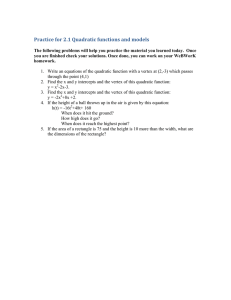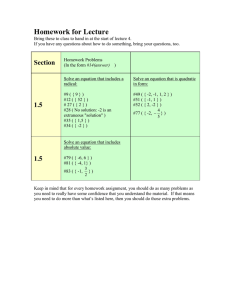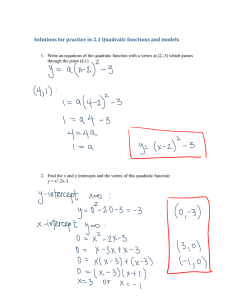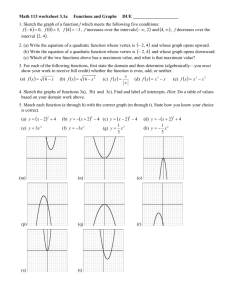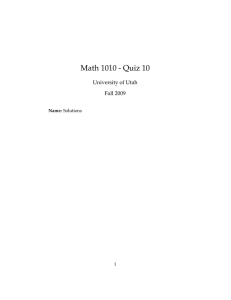WOODLAND HILLS HIGH SCHOOL LESSON PLAN STAGE I – DESIRED RESULTS
advertisement
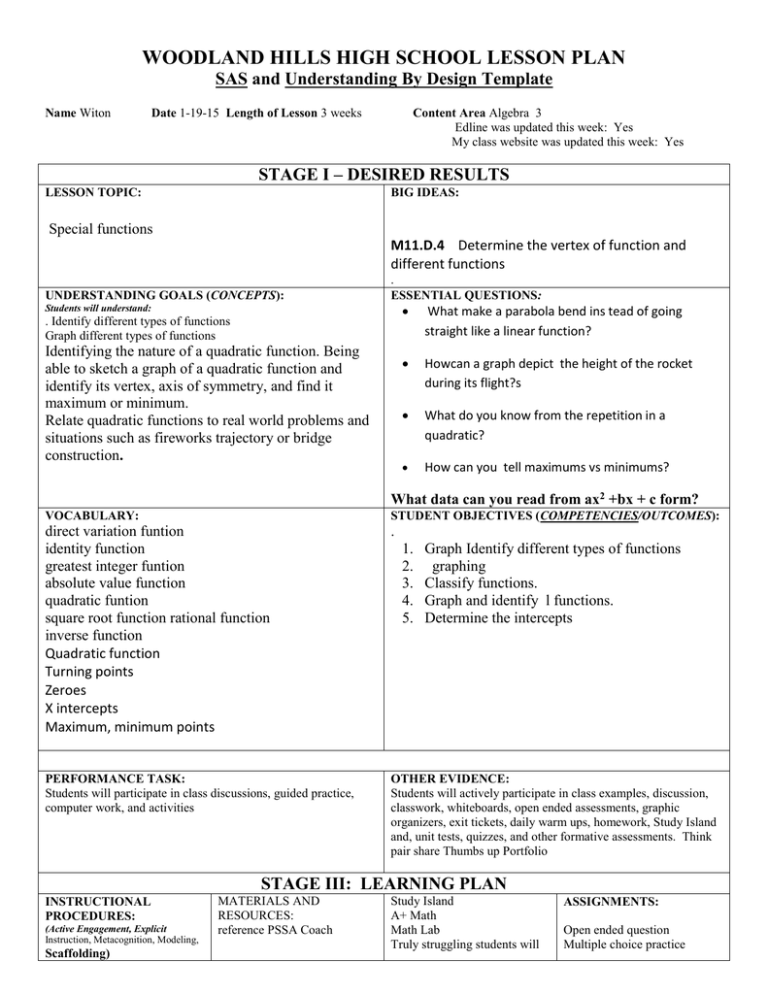
WOODLAND HILLS HIGH SCHOOL LESSON PLAN SAS and Understanding By Design Template Name Witon Date 1-19-15 Length of Lesson 3 weeks Content Area Algebra 3 Edline was updated this week: Yes My class website was updated this week: Yes STAGE I – DESIRED RESULTS LESSON TOPIC: BIG IDEAS: Special functions M11.D.4 Determine the vertex of function and different functions UNDERSTANDING GOALS (CONCEPTS): . ESSENTIAL QUESTIONS: Students will understand: . Identify different types of functions Graph different types of functions Identifying the nature of a quadratic function. Being able to sketch a graph of a quadratic function and identify its vertex, axis of symmetry, and find it maximum or minimum. Relate quadratic functions to real world problems and situations such as fireworks trajectory or bridge construction. What make a parabola bend ins tead of going straight like a linear function? Howcan a graph depict the height of the rocket during its flight?s What do you know from the repetition in a quadratic? How can you tell maximums vs minimums? What data can you read from ax2 +bx + c form? VOCABULARY: STUDENT OBJECTIVES (COMPETENCIES/OUTCOMES): direct variation funtion identity function greatest integer funtion absolute value function quadratic funtion square root function rational function inverse function Quadratic function Turning points Zeroes X intercepts Maximum, minimum points . PERFORMANCE TASK: Students will participate in class discussions, guided practice, computer work, and activities OTHER EVIDENCE: Students will actively participate in class examples, discussion, classwork, whiteboards, open ended assessments, graphic organizers, exit tickets, daily warm ups, homework, Study Island and, unit tests, quizzes, and other formative assessments. Think pair share Thumbs up Portfolio 1. 2. 3. 4. 5. Graph Identify different types of functions graphing Classify functions. Graph and identify l functions. Determine the intercepts STAGE III: LEARNING PLAN INSTRUCTIONAL PROCEDURES: (Active Engagement, Explicit Instruction, Metacognition, Modeling, Scaffolding) MATERIALS AND RESOURCES: reference PSSA Coach Study Island A+ Math Math Lab Truly struggling students will ASSIGNMENTS: Open ended question Multiple choice practice Activite Engagement Do NOW will include a spiraling review of prior knowledge as well as the upcoming lesson. We will use Collins writing 1 and 2 daily Support Daily: Warm up will include a spiraling review of prior knowledge to include the upcoming lesson Daily: Check for understanding using warmup, homework, or formative assessment questioning to determine whether to continue as needed or do interventions as needed. ( model, spiral scaffolding, instruct/reteach, as needed) MINI LESSONS Mini lessons will vary daily based upon student needs and informal assessments. We will use Active Engagement and Scaffolding within each lesson. Examples: *intercepts vertex zero absolute value quadratic *Box-and-whisker, stem-andleaf, bar graphsNote Taking, Modeling, Whole Class Response, Partnering, Higher Level Thinking Skills Guided Notes, Chunking, Build on prior Knowledge, Teacher Prompting, Visual Support Independence Practice: Check for understanding using practice pages and text as well as school/SAS developed activities. Summative/Formative Assessments: Quizzes as needed for understanding. Unit test is summative as well as cumulative for constant knowledge retention. Students will actively participate in class examples, discussion, class work, whiteboards, open ended assessments, graphic organizers, exit tickets, daily Glencoe Algebra 2 Text Calculators Computers Supplemental Materials Warm ups & Exit polls Guided practice and Enrichment remidal work Additional materials as needed be referred to guidance/SAP (RTI)Small group/ flexible grouping will occur if necessary. Students will be encouraged to stay for math lab, or find help with a math teacher. worksheets enrichment warm ups, homework, Study Island and, unit tests, quizzes, and other formative assessments. Reflections: Check for understanding using do now, homework, or formative assessment questioning to determine whether to continue as needed or do interventions as needed. (Model, spiral scaffolding, instruct/reteach as needed) MINI lesson” Test taking Strategies open ended Strategies proportions word backwords
